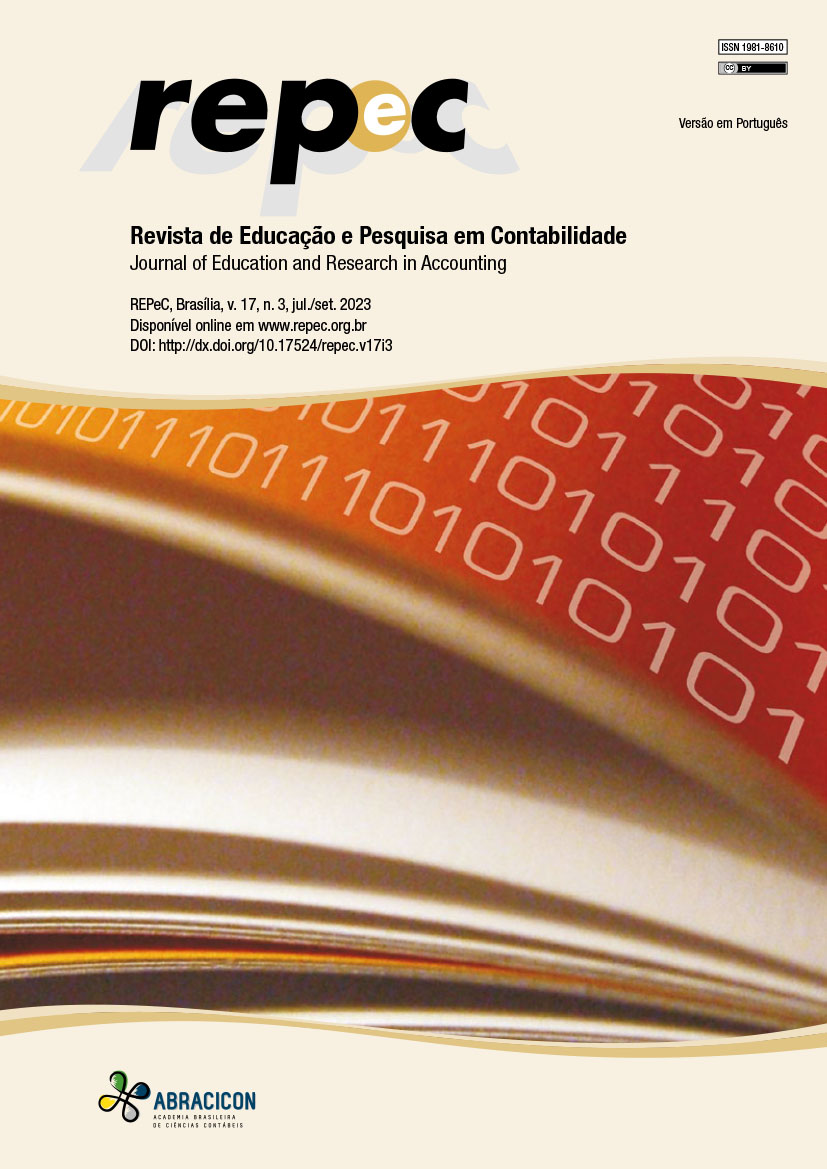A Endogeneidade e a Importˆancia dos Quase-Experimentos para a Inferˆencia Causal nas Pesquisas em Contabilidade
DOI:
https://doi.org/10.17524/repec.v17i3.3357Keywords:
Endogeneidade, Causalidade, Quase-experimento, Pesquisa contábilAbstract
Propomos apresentar algumas reflex˜oes sobre a pesquisa causal na Contabilidade, com destaque para o problema da Endogeneidade. Procuramos discutir, de forma introdut´oria, a importˆancia dos quase-experimentos, especificamente de técnicas que podem ser solu¸c˜oes vi´aveis para muitos projetos de pesquisa na ´area. Dentre essas t´ecnicas, destacamos o desenho de Diferen¸ca-em-Diferen¸cas, o uso de Vari´aveis Instrumentais e o desenho de Regress˜ao Descont´ınua. Com isso, buscamos estimular a ado¸c˜ao de m´etodos mais rigorosos de identifica¸c˜ao, no intuito de elevar a preocupa¸c˜ao com a qualidade das pesquisas na nossa ´area e abrir, portanto, caminhos para um ambiente de pesquisa cont´abil mais s´olido e inovador.
References
Ahern, K. R. & Dittmar, A. K. (2012). The changing of the boards: The impact on firm valuation of mandated female board representation. The Quarterly Journal of Economics, 127(1), 137–197. https://doi.org/10.1093/qje/qjr049.
Angrist, J. D. & Pischke, J. (2009). Mostly harmless econometrics: An empiricist’s companion. Princeton university press.
Baker, A. C., Larcker, D. F., & Wang, C. C. Y. (2022). How much should we trust staggered difference-in-differences estimates? Journal of Financial Economics, 144(2), 370–395. https://doi.org/10.1016/j.jfineco.2022.01.004.
Ball, R. & Brown, P. (1968). An empirical evaluation of accounting income numbers. Journal of Accounting Research, 6(2), 159–178. https://doi.org/10.2307/2490232.
Beaver, W. (1968). Market prices, financial ratios, and the prediction of failure. Journal of Accounting Research, 6(2), 179–192. https://doi.org/10.2307/2490233.
Bennedsen, M., Nielsen, K. M., Perez-Gonzalez, F., & Wolfenzon, D. (2007). Inside the family firm: The role of families in succession decisions and performance. The Quarterly Journal of Economics, 122(2), 647–691. https://doi.org/10.1162/qjec.122.2.647.
Cunningham, S. (2021). Causal inference: The mixtape. Yale university press.
Duryea, S., Ribas, R. P., Sampaio, B., Sampaio, G. R., & Trevisan, G. (2023). Who benefits from tuition-free, top-quality universities?Evidence from Brazil. Economics of Education Review, 95, 102423. https://doi.org/10.1016/j.econedurev.2023.102423.
Gow, I. D., Larcker, D. F., & Reiss, P. C. (2016). Causal inference in accounting research. Journal of Accounting Research, 54(2), 477–523. https://doi.org/10.1111/1475-679X.12116.
Guimar˜aes, R. & Trevisan, G. (2022). Mandatory CEO Non-Duality, Managerial Agency, and Shareholder Value. Working Paper, SSRN. https://ssrn.com/abstract=4122646.
Larcker, D. F., Richardson, S. A., & Tuna, I. (2007). Corporate governance, accounting outcomes, and organizational performance. The Accounting Review, 82(4), 963–1008. https://doi.org/10.2308/accr.2007.82.4.963.
Larcker, D. F. & Rusticus, T. O. (2010). On the use of instrumental variables in accounting research. Journal of Accounting and Economics, 49(3), 186–205. https://www.sciencedirect.com/science/article/pii/S0165410109000718.
Roth, J., Sant’Anna, P. H. C., Bilinski, A., & Poe, J. (2023). What’s trending in difference-indifferences? A synthesis of the recent econometrics literature. Journal of Econometrics, 235(2), 2218–2244. https://doi.org/10.1016/j.jeconom.2023.03.008.
Wooldridge, J. M. (2015). Introductory econometrics: A modern approach. Cengage learning.
Downloads
Published
How to Cite
Issue
Section
License
Copyright (c) 2023 Journal of Education and Research in Accounting (REPeC)

This work is licensed under a Creative Commons Attribution 4.0 International License.
Authors who publish with this journal agree to the following terms:
Authors retain copyright and grant the journal right of first publication with the work simultaneously licensed under Creative Commons Attribution 3.0 Unported License, which allows the sharing of the work and recognition of authorship and its initial publication in this journal. This license allows others to distribute, remix, adapt, or create derivative works, even for commercial purposes, provided credit is given for the original creation.
b)There is no financial compensation to the authors in any capacity, for articles published in RePEc.c) The articles published in RePEc are the sole responsibility of the authors.
